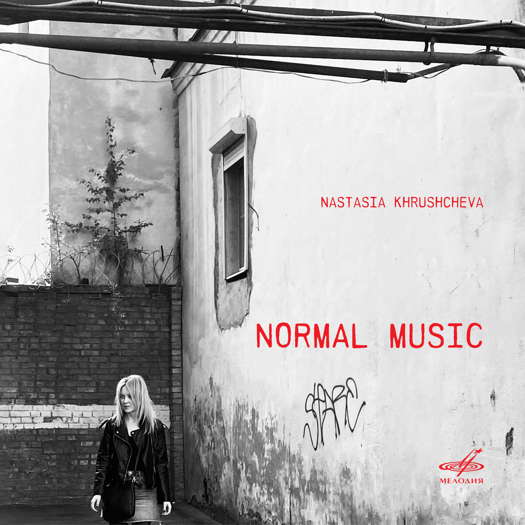- Iuventus Quartet
- Haitink
- al fresco
- solo piano
- Turnage
- Central England Camerata
- Farabi Orchestra
- Harold Truscott
 SPONSORED: Ensemble. Last Gasp of Boyhood. Roderic Dunnett investigates Jubilee Opera's A Time There Was for the Benjamin Britten centenary.
SPONSORED: Ensemble. Last Gasp of Boyhood. Roderic Dunnett investigates Jubilee Opera's A Time There Was for the Benjamin Britten centenary.
All sponsored features >>
 VIDEO PODCAST: Come and meet Eric Fraad of Heresy Records, Kenneth Woods, musical director of Colorado MahlerFest and the English Symphony Orchestra and others.
VIDEO PODCAST: Come and meet Eric Fraad of Heresy Records, Kenneth Woods, musical director of Colorado MahlerFest and the English Symphony Orchestra and others.

Music as Manifesto
JOHN DANTE PREVEDINI listens to contemporary music by Nastasia Khrushcheva
'... genuinely powerful and positively transformative ...'
Normal Music is the recent debut on the label Melodiya of contemporary Russian composer Nastasia Khrushcheva. The album, available as both CD and digital release, showcases three works: The Book of Grief and Joy in six movements for string orchestra and piano, Trio in Memory of a Non-Great Artist for standard piano trio and Russian Dead-Ends 3 for solo piano. The album features the OpensoundOrchestra, conductor/violinist Stanislav Malyshev, cellist Olga Kalinova and Khrushcheva herself on piano. The liner notes, written by Sergei Uvarov, explain that this album of new music is intended as a companion to Khruscheva's 2020 book Metamodernism in Music and Around It, a 'manifesto of [her] style and worldview' in which 'shards' of a lost common-practice age are recycled in a stagnant nexus of contemporary nostalgia for old self-exhausted traditions. The challenge of reviewing this album is thus twofold; it is both a collection of music and an introduction to a new philosophy of art.
To address the philosophical implications of the album's conceptual structure, it seems necessary to begin with the very notion of 'metamodernism' itself. The name implies something which is 'beyond modernism' in practice while perhaps still relating to it in terms of ultimate goals. Uvarov briefly mentions, without further explanation, that Khrushcheva's metamodernism is also meant to be in contrast with postmodernism (a term which musicologists today mostly use to refer to the refutation of twentieth-century modernism by composers over the past fifty years or so). Both modernism and postmodernism are terms I have seen used to refer alternately to styles, compositional philosophies or even entire eras of Western classical music since the twentieth century. I thus think it safe to say these terms are fraught with ongoing controversy, and I predict that Khrushcheva's concept of metamodernism - if widely given the serious consideration that I think it deserves - will prove no different. One thing further complicating the matter is that it remains unclear whether Khrushcheva envisions metamodernism primarily as a descriptive philosophy of our current era in Western classical music, as her personal philosophy of composition or as a specific aesthetic style. For the practical purposes of reviewing this album, I will consider the latter two of these interpretations of metamodernism as they relate to Khrushcheva's music.
We start with the eighteen-minute Book of Grief and Joy in six untitled movements for piano and string orchestra. The opening movement presents us with a pseudo-minimalistic 'groove' that is soon thwarted by unpredictable metrical shifts and an unanticipated expansion of dynamic, harmonic and textural ranges.
Listen — Nastasia Khrushcheva: I (The Book of Grief and Joy)
(track 1, 0:00-0:30) ℗ 2021 Melodiya :
The second movement builds on the first movement by using a similar ostinato, though here it is overlaid with more melodic passages for string soloists. The third movement presents us with a slower ostinato punctuated by bowed glissando and col legno string gestures. This atmosphere is continued in the fourth movement, though with a slower tempo, more lyrical strings and an arch-form dynamic structure. Movement five harkens back to the opening movement with driving asymmetric meters and a continuous forte dynamic. Finally, movement six reprises the opening movement outright, though it ends with a more forceful crescendo and an expansion of the voicings. The six movements together reveal a musical landscape that is indeed cyclical and self-referential while still preserving a sense of thematic development and expressive variety along multiple compositional parameters.
The next work, Trio in Memory of a Non-Great Artist, is so named - Uvarov explains in the liner notes - in allusion to Tchaikovsky's trio In Memory of a Great Artist. The four-minute composition consists of a variety of independent musical gestures meant to deliberately evoke the images of composers and instrumentalists who are 'mediocre' in the traditional sense. Here, crashing bass chords introduce an athematic and juvenile piano waltz overlaid with whining glissandi and furious tremolo double-stop passages on strings, the latter using what appears to be a deliberately 'poor' tone technique. Despite the numerous audible references to inferior musicianship, however, the organizational structure of the piece strikes me as very well balanced in terms of dynamics, timbre and rhythmic energy. In other words, this is not mediocre music at all. On the contrary, it is thoughtful and powerful music about mediocrity. Nor does it strike me as satirical. Rather, it seems to be a sincere tribute to the inherent value of genuine artistic efforts which nonetheless fall short of an externally imposed aesthetic ideal.
Listen — Nastasia Khrushcheva: Trio in Memory of a Non-Great Artist
(track 7, 0:00-0:30) ℗ 2021 Melodiya :
The album concludes with the half-hour Russian Dead-Ends 3 for solo piano in one movement. This work confronts us with a series of seemingly disconnected musical statements firmly rooted in the tradition of Russian late Romanticism, all of which are left undeveloped and abandoned after only a few seconds. Each fragment is simply followed by a silent pause of a few seconds before the music moves on to the next fragment, and this process continues over the entire duration of the piece. The 'dead-end' behavior of this music, however, eventually reveals itself to be a deception. The disembodied fragments may be individually 'undeveloped' by the standards of Russian late Romantic aesthetics, but the harmonic, rhythmic, timbral and thematic relationships among the isolated fragments slowly become apparent as the longer temporal structures of the music are unveiled. Thus, this is music which appears to go nowhere at first glance and then gradually reveals the true plane on which its compositional development and innovation are expressed.
Listen — Nastasia Khrushcheva: Russian Dead-Ends-3
(track 8, 0:00-0:30) ℗ 2021 Melodiya :
In conclusion, I consider Normal Music to be a genuinely powerful and positively transformative document of music as manifesto. Khrushcheva's philosophy addresses the creative angst of our world, while her music reaffirms the continuing worth of our lives within it. Furthermore, the concept of metamodernism is one which I encourage members of the contemporary Western classical music community to sincerely consider from a variety of vantage points. Though it may be potentially controversial as a descriptive generalization for the present era in Western classical music history, I nonetheless encourage further research, discussion and debate on the topic. In any case, metamodernism - at the very least - reveals itself through this album to be a compositional approach which achieves something existentially both timely and timeless.
Copyright © 24 January 2022
John Dante Prevedini,
Connecticut, USA

CD INFORMATION - NASTASIA KHRUSHCHEVA: NORMAL MUSIC
ARTICLES ABOUT CONTEMPORARY CLASSICAL MUSIC
CLASSICAL MUSIC ARTICLES ABOUT RUSSIA
RECENT CLASSICAL MUSIC CD REVIEWS


